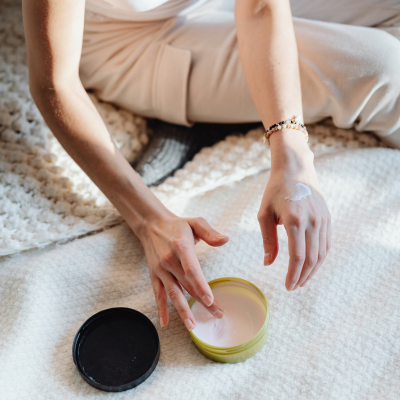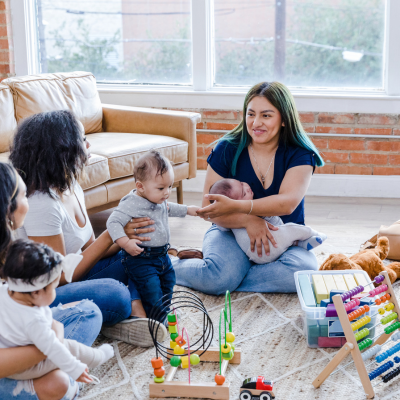When you think about self-care strategies, you probably conjure up images of bubble baths, candles, expensive pedicures and facials…and quickly determine that self-care must not be for YOU (who can afford that stuff?)
Now, don’t get me wrong, these things can feel amazing but they only represent one tiny possibility of what self-care might actually look like for you.
And for many (or most?) busy moms, day-to-day self-care strategies don’t involve spas, nail polish, or other lux ways of being pampered.
In fact, self-care isn’t really about pampering at all. We deserve to care for ourselves without categorizing it as pampering… as if it’s some kind of luxury.
It isn’t a luxury. It’s a necessity.
A New Take On Self-Care
When we break it right down, “self-care” represents just about anything we do on a day to day basis to take care of self.
That’s it. Simple. It isn’t necessarily expensive, extravagant, luxurious, selfish. It’s just what you need to do in order to carry on being awesome.
For busy parents in particular, your ability to care for yourself gets incredibly challenged when you put others’ needs above your own. And nautrally, you are going to do this as a parent, especially in the early days, but there are ways to get back to focusing on YOU.
Self-Care Looks Different For Everyone
Each person will have a unique way to feel cared for, depending on who they are as an individual, and what their life is like at that particular moment. Makes sense, right?
Our needs are different from one another, and our context is also different. We need to investigate our self and our situation so that we can determine what self-care strategies we should focus on in order to actually improve our well-being.
Here are my 7 Essential Self-Care Strategies (that go beyond massages and pedicures)
1. Seek Quiet Time
Whether you are a self-proclaimed introvert or someone who recharges through interactions with others, you may find that giving yourself a “time-out” is the best… thing… ever! We all need a break in stimulation, answering questions, making snacks, listening to music (or squabbling children). This might be your time to journal, meditate, sit in the bath, go for a solo walk.
Whatever form it takes, the key is to be alone and reduce stimulation so that your brain has some time to rest.
2. Take Care of Business
It’s all about pragmatism, or you know…being an adult. Sometimes the best way to take care of yourself is to take care of the things that are stressing you out! Pay your bills, reply to emails, clean your bathroom, make your bed.
It sounds funny to pair self-care with tasks like these, but honestly, taking care of business is an essential part of reducing stress and feeling in control.
3. Tend to Your Body
Taking care of your physical health isn’t a novel idea, but one that most people need a reminder about. We know by now that we should exercise often, eat clean and nutritious food and sleep well. But I’d add a few more ideas here:
Self-care is also about making sure we are staying on top of things like: dentist appointments, pap-tests, and taking our medication properly. It might help to think about what you do for your children to make sure their bodies are healthy, and try to apply these same efforts to yourself.
4. Nurture Relationships
We don’t typically think about relationships when we talk about self-care (self, afterall). But part of our needs as social creatures is to have meaningful connections with others. Your self-care strategy might include carving out time to tend to your valued relationships with friends or family members.
If you think about it, YOU actually benefit from nurturing these relationships, which is why it’s part of SELF-care. You feel good when you put energy into your friendships, and you benefit from this kind of closeness.
Spending time with friends is also a good reminder that there is more to your identity than “mom” or “wife” (not that either of these are bad, just possibly an incomplete representation of who you are).
5. Invite Creative Opportunities
And don’t say you aren’t creative!
We are all creative in our own unique ways (notice a theme here?). Creativity isn’t just about painting or jewellery making. What about cooking? Gardening? Designing your dream cottage? Decorating? Building something? Writing? Hosting friends for dinner? Photo editing?
There are so many ways to get your creative juices flowing. If you feel in a slump, bored or stuck, try adding some form of creativity into your routine to shake things up and get you on a more positive, energetic path.
6. Find Intellectual Stimulation
I don’t know about you, but my experience in the early days of mothering felt a little…under-stimulating. I remember going back to work part time and feeling so excited that I was actually using the intellectual part of my brain again!
Now, I am the first to say that staying at home with kids is waaayyyy harder than going to work. But there is something really important with my experience that I think parents can access without actually having to go outside the home. It’s all about stimulating a different part of your brain that you don’t always use when you’re at home (after all, you likely aren’t sharing deep thoughts or grappling with new concepts with your toddlers…).
Maybe you pick up a new hobby, or at least start learning about it. It doesn’t have to be “academic” per se, just something you’re interested in! Read a new book, or listen to TED talks or podcasts that you’re drawn to. Basically, find a way to step outside of your normal day-to-day thought cycles and try to challenge your thinking a little bit.
You’ll find that you start having conversations about what you’re learning and this is so refreshing! We all having intellectual and learning needs – make sure you are caring for them!
7. Spiritual Connection
There’s a million ways to relate to spirit – whether it’s through established religion or through other forms of spirituality – there is by no means one way. Regardless of your beliefs, many people appreciate feeling connected and aware of a higher power or spirit.
This might simply mean taking that extra moment next time you’re in nature to appreciate Mother Earth. Maybe you light a candle with more intention, appreciation, gratitude for your life. Maybe you’ve been drawn to learn about your ancestors. Or maybe you’re ready to reconnect with your church?
Whatever it is that resonates with you, see if you can listen a little more carefully to what you’re drawn to and how you might be able to incorporate this into your self-care routines.
Unique Self, Unique Context, Unique Self-Care
I believe that each self-care realm is relevant for everyone. However, some areas might draw you in more than others (which is perfectly normal). You might even find yourself quite resistant to exploring some strategies, which is also fine – take it in as information and simply be curious about why this might be.
Certain times in your life might also call for more focused attention in specific areas. For example, when you very busy and overwhelmed, it often makes the most sense to focus on pragmatic self-care strategies (like cleaning, organizing, and paying bills) so that you can feel more in-control.
When you’re feeling intense stress, you might choose to focus your self-care strategies on physical health, knowing that stress can compromise your immune system.
You see, your self-care strategies are completely reliant on self-knowledge (knowing who you are, what is effective for you, what you need, and what your particular situation calls for).
It’s all about listening to your cues, trusting yourself, and giving yourself permission to take time and energy for you. That whole permission piece might be the biggest challenge!
The more you can check in with yourself, detect what it is that you most need, and then take intentional action to address these, the more effective your efforts will be.








Comments +